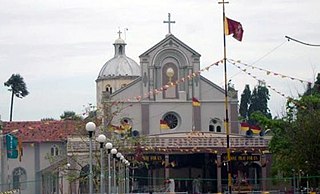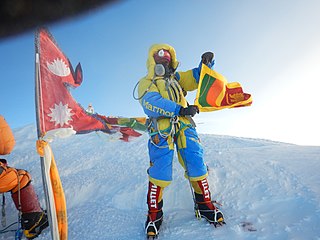Related Research Articles

The Sri Lankan Civil War was a civil war fought in Sri Lanka from 1983 to 2009. Beginning on 23 July 1983, it was an intermittent insurgency against the government by the Velupillai Prabhakaran-led Liberation Tigers of Tamil Eelam. The LTTE fought to create an independent Tamil state called Tamil Eelam in the north-east of the island, due to the continuous discrimination and violent persecution against Sri Lankan Tamils by the Sinhalese-dominated Sri Lanka government.

Chandrika Bandaranaike Kumaratunga , commonly referred to by her initials CBK, is a Sri Lankan politician who served as the fifth president of Sri Lanka, from 12 November 1994 to 19 November 2005. The country's first and only female president to date and the country's second female prime minister. She is the daughter of two former prime ministers and was the leader of the Sri Lanka Freedom Party (SLFP) until the end of 2005.
Sirima Ratwatte Dias Bandaranaike, commonly known as Sirimavo Bandaranaike (මැතිනිය), was a Sri Lankan politician. She was the world's first female prime minister when she became Prime Minister of Sri Lanka in 1960. She chaired the Sri Lanka Freedom Party (SLFP) from 1960 to 1994 and served three terms as prime minister, two times as the chief executive, 1960 to 1965 and 1970 to 1977, and once again in a presidential system from 1994 to 2000, governing under the presidency of her daughter Chandrika Kumaratunga.
Sunila Abeysekera was a Sri Lankan human rights campaigner. She worked on women's rights in Sri Lanka and in the South Asia region for decades as an activist and scholar. Quitting a career as a singer, Abeysekera briefly joined the Janatha Vimukthi Peramuna and then founded the Women and Media Collective in 1984. As head of the INFORM Human Rights Documentation Centre, she monitored human rights violations by all parties in the civil war. She received the United Nations Human Rights Award in 1999 and the Didi Nirmala Deshpande South Asian Peace and Justice Award in 2013.

The Vankalai massacre was a massacre of a family of four minority Sri Lankan Tamils at the hands of the Sri Lankan military personnel from the village of Vankalai in Mannar District, Sri Lanka on June 8, 2006. The victims were tortured and the mother was gang raped before her murder.
The expulsion of the Muslims from the Northern province was an act of ethnic cleansing carried out by the Tamil militant Liberation Tigers of Tamil Eelam (LTTE) organization in October 1990. Yogi, the LTTE's political spokesman, stated that this expulsion was carried out in retaliation for atrocities committed against Tamils in the Eastern Province by Muslims, who were seen by the LTTE as collaborators with the Sri Lankan Army. As a consequence, in October 1990, the LTTE forcibly expelled 72,000 Muslims from the Northern Province.
Deshamanya Radhika Coomaraswamy is a Sri Lankan lawyer, diplomat and human rights advocate who served as the Under-Secretary-General of the United Nations, Special Representative for Children and Armed Conflict until 13 July 2012. Secretary-General Kofi Annan appointed her to the position in April 2006. She was nominated to the Constitutional Council as a civil representative on 10 September 2015. In 2017, after atrocities against the Rohingya people, she was appointed a Member of the United Nations Fact Finding Mission on Myanmar.
The University Teachers for Human Rights (Jaffna) or UTHR(J) was formed in 1988 at the University of Jaffna, Jaffna, in Sri Lanka, as part of the national organization University Teachers for Human Rights. Its public activities as a constituent part of university life came to a standstill after the assassination on September 21, 1989 of Rajini Thiranagama, a key founding member, for which the group blamed the LTTE.
Ida Carmelitta or Farheen Ida Carmelitta Laila Figerardo was a minority Sri Lankan Tamil woman who was gang raped and killed on 12 July 1999 and became a cause célèbre of the Sri Lankan civil war.

Eelam War IV is the name given to the fourth phase of armed conflict between the Sri Lankan military and the separatist Liberation Tigers of Tamil Eelam (LTTE). Renewed hostilities began on the 26 July 2006, when Sri Lanka Air Force fighter jets bombed several LTTE camps around Mavil Aru anicut. The government's casus belli was that the LTTE had cut off the water supply to surrounding paddy fields in the area. Shutting down the sluice gates of the Mavil Aru on July 21 depriving the water to over 15,000 people - Sinhalese and Muslim settlers under Sri Lankan state-sponsored colonisation schemes in Trincomalee district. They were denied of water for drinking and also cultivating over 30,000 acres of paddy and other crops. The fighting resumed after a four-year ceasefire between the Government of Sri Lanka (GoSL) and LTTE. Continued fighting led to several territorial gains for the Sri Lankan Army, including the capture of Sampur, Vakarai and other parts of the east. The war took on an added dimension when the LTTE Air Tigers bombed Katunayake airbase on March 26, 2007, the first rebel air attack without external assistance in history.

Lasantha Manilal Wickrematunge was a high-profile Sri Lankan journalist, politician, broadcaster and human rights activist who was assassinated in January 2009.

The International Women of Courage Award, also referred to as the U.S. Secretary of State's International Women of Courage Award, is an American award presented annually by the United States Department of State to women around the world who have shown leadership, courage, resourcefulness, and willingness to sacrifice for others, especially in promoting women's rights.
Tamara Manimekhalai Kunanayakam is a Sri Lankan diplomat. She was the former Permanent Representative of Sri Lanka to the United Nations Office at Geneva and Sri Lankan Ambassador to Holy See.

Jayanthi Kuru-Utumpala is a Sri Lankan adventurer, professional rock climber, motivational speaker, and LGBT and women's rights activist. She is the first person from Sri Lanka to summit Mount Everest, which she achieved on 21 May 2016. Kuru-Utumpala is an advocate for women's rights in Sri Lanka and has spent most of her adult life researching gender studies and women's rights. She formed a collaboration with fellow mountaineer Johann Peries for several expeditions.

Marini De Livera is a Sri Lankan lawyer and social activist who also served as former chairperson of the National Child Protection Authority (NCPA) in Sri Lanka. In 2019, she was awarded the International Women of Courage Award by the United States Department of State.
Rupika Damayanthi De Silva is a Sri Lankan peace and women's rights activist. She is the founder of the non-governmental organization Saviya Development Foundation which supports peace building, and women and children's rights. She has worked to unify Sinhala women in the north part of the Philippines with Tamil women in the south. In 2004 De Silva worked to help women affected by the Indian Ocean earthquake and tsunami.
Sexual violence against Tamils in Sri Lanka has occurred repeatedly during the island's long ethnic conflict. The first instances of rape of Tamil women by Sinhalese mobs were documented during the 1958 anti-Tamil pogrom. This continued in the 1960s with the deployment of the Sri Lankan Army in Jaffna, who were reported to have molested and occasionally raped Tamil women.

Ranitha Gnanarajah is a Tamil Sri Lankan human rights activist and lawyer. She has been widely praised for her efforts in advocating for the rights of victims of enforced disappearances and those detained under the Prevention of Terrorism Act. Ranitha has been known to have provided free legal assistance to prisoners detained without charge. She received the prestigious International Women of Courage Award in 2021 coinciding with the International Women's Day during a virtual event conducted by the United States Secretary of State.
Swasthika Arulingam is a Sri Lankan human rights lawyer, women's rights activist, human rights activist and political activist. She also serves as a prominent member of the Liberation Movement.
References
- 1 2 3 "Shreen Saroor". Ashoka United States. Retrieved 7 October 2020.
- 1 2 "Courage and Compassion in Sri Lanka: Shreen Abdul Saroor". Stiftung die schwelle (in German). Retrieved 7 October 2020.
- 1 2 3 "Shreen Abdul Saroor". N-PEACE. Retrieved 7 October 2020.
- ↑ Mendez, Luz; Salamat, Zarina; Saroor, Shreen Abdul; Thorpe, Christina (2004). "Leading the Way to Peace, Women Peacemakers". Women's Learning Partnership. Retrieved 7 October 2020.
- ↑ Pilapitiya, Purnima (18 December 2017). "Shreen Abdul Saroor: Passionate Crusader For Women's Rights Receives International Recognition". dbsjeyaraj.com. Retrieved 7 October 2020.
- ↑ "Spotlight on Franco-German Human Rights Award winner, Sri Lanka's Shreen Saroor | Daily FT". Daily FT. Retrieved 7 October 2020.
- ↑ "Shreen Saroor - Women's Action Network (WAN)". Ashoka United States. Retrieved 7 October 2020.
- ↑ "Shreen Abdul Saroor, Author at Colombo Telegraph". Colombo Telegraph. Retrieved 7 October 2020.